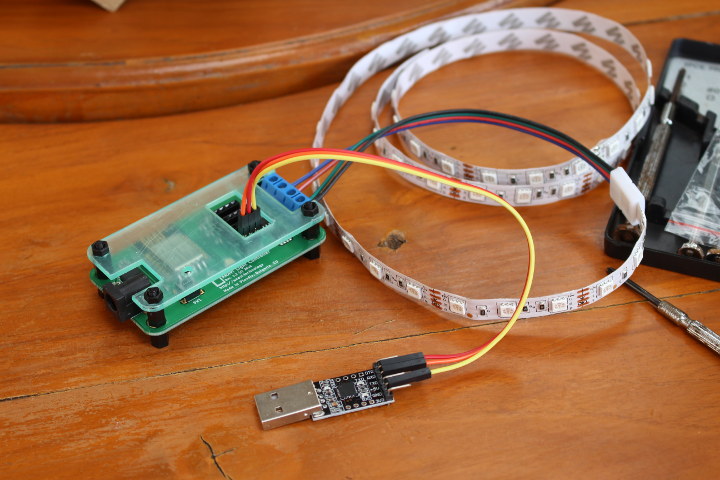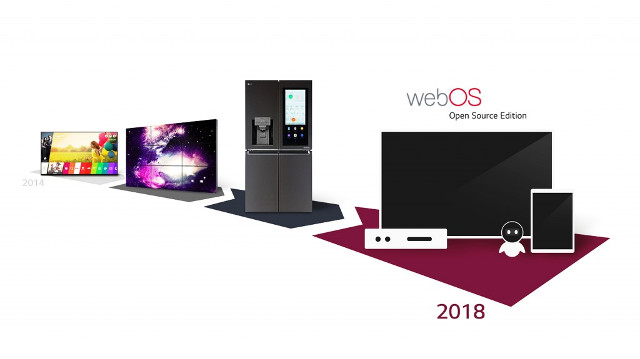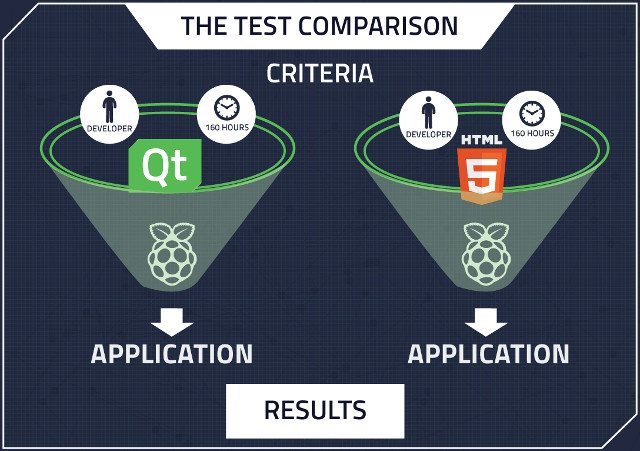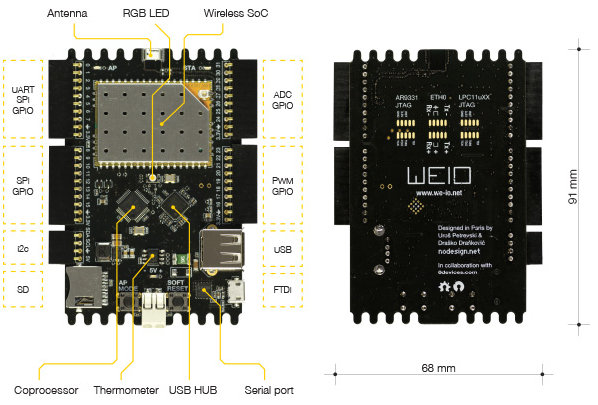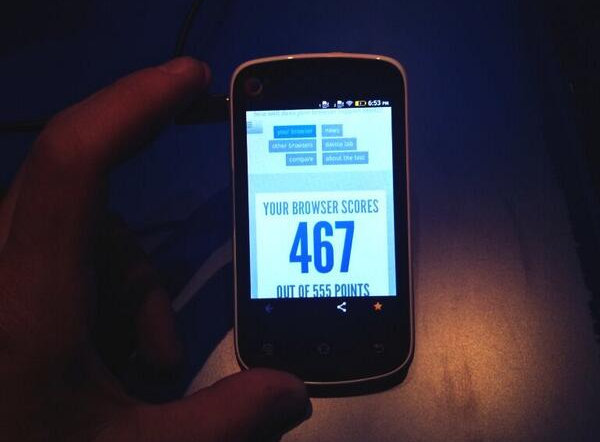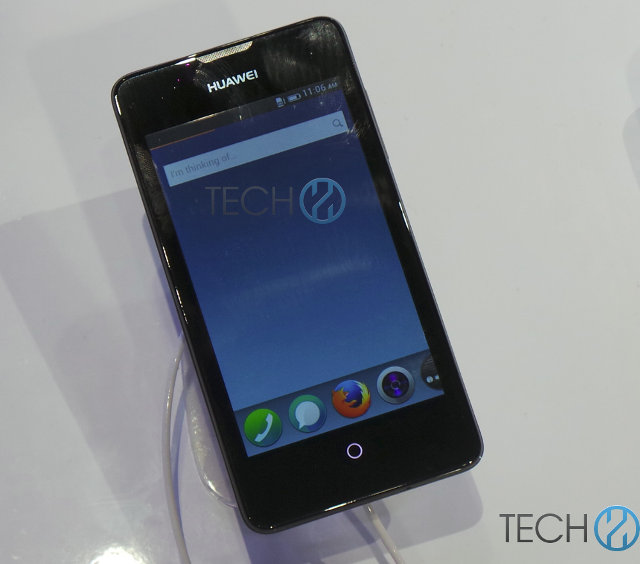A few months ago I reviewed ANAVI Light pHat for Raspberry Pi which allows you to control an LED RGB strip from the popular development board. However, if all you need is to switch the RGB LED light on and off, or change the color, the hardware is clearly overpowered for the tasks. So Leon ANAVI designed another board based on ESP8266 – ANAVI Light Controller – which does the same thing with lower cost and more power efficient hardware. Leon sent me a sample for review, so let’s see what we’ve got. ANAVI Light Controller Starter Kit Unboxing I received a package for the Starter kit that’s offered for $39 on CrowdSupply. We’ve got the main board, a USB debugging, an acrylic enclosure with screws and spacers, a one meter RGB LED strip, and some stickers inside the package. If we have a close look at the board we […]
LG Releases webOS Open Source Edition Optimized for Raspberry Pi 3
webOS, originally developed by Palm, is a Linux based multitasking operating systems with support for HTML5 and CSS3. It is now found in most (all?) new LG smart TVs, and the TV manufacturer has decided to expand the adoption of webOS by collaborating with the South Korean government and local startups, and released an open source version , webOS Open Source Edition, available publicly at http://webosose.org. webOS Open Source Edition 1.0 is said to be optimized for the Raspberry Pi 3, and the company provides build instructions on the “setting up” page of the website to build the firmware image, which you can then flash to a micro SD card. The idea is to for a community around the open source version webOS, and let different categories of developers or users contribute to the project: System UI Developers – The System UI is based on Blink and Qt, and developers […]
Qt/QML vs HTML5/AngularJS User Interfaces Showdown (Video)
We now live in a world where there’s a push for higher level programming languages either based on web technologies like HTML5 or JavaScript, or other interpreted languages such as Python, and lower level languages such as C, C++, or – maybe more understandably – Assembler are often avoided by newcomers. But there are advantages of using native code, as demonstrated by Sequality, a software engineering company, who asked a developer familiar with HTML and C++ to develop a demo of an embedded systems using HTML5 + AngularJS and Qt/QML. The developer had 160 hours to develop the user interface for each framework, and with the resulting demos running on a Raspberry Pi 3 board with Raspbian, it was found that the Qt/QML implementation delivered a more responsive and functional user interface compared to the HTML5 version which tended to lag, and lacked support for touchscreen and a software keyboard […]
WeIO is an Open Source Hardware IoT Board Programmable from a Web Browser (Crowdfunding)
WeIO is an open source hardware board for the Internet of things with Wi-Fi connectivity and lots of I/Os designed by nodesign, a French based startup, in collaboration of 8devices, the makers of the Carambola boards. WeIO is powered by an Atheros AR9331 SoC running OpenWRT as well as an NXP LPC MCU for faster handling of I/Os and support for analog I/Os. One interesting aspect of this board is that it can be programmed via a web browser using HTML5 or Python, and it does not rely on the Cloud to store data. WeIO hardware specifications: SoC – Atheros AR9331 MIPS 24K Wireless SoC @ 400 MHz MCU – NXP LPC11xx ARM Cortex M0 MCU for analog I/O and real-time H/W interfaces System Memory – 64 MB DDR2 Storage – 16 MB flash + micro SD slot Connectivity – 802.11 b/g/n Wi-Fi with on-board antenna (AP and STA modes), […]
Mozilla Working on $25 Firefox OS Smartphones With Spreadtrum SC6821 SoC
The cheapest Android smartphones cost about $50, and this price is still a barrier to entry to many, as about 46.4% of phones sold worldwide in 2013 were feature phones according to Gartner, which still corresponds to about 838 million units per year. Mozilla and Spreadtrum are currently working together to bring $25 smartphones to market, and that’s retail price, running Firefox OS and powered by the latest Spreadtrum SC6821 SoC. The $25 smartphone will come with 128 MB RAM, 256 MB NAND flash, and feature a 3.5″ HVGA touchscreen, built-in Wi-Fi and Bluetooth, FM radio, and run Firefox OS with HTML5 apps such as Twitter and Facebook, and access to a full web browser, according to Spreadtrum representatives. You would certainly not trade this phone with your existing Android phone, but if all you could afford until now was a feature phone, these upcoming ultra low cost Firefox OS […]
Huawei Ascend Y300 F1 Firefox OS Phone Features Qualcomm MSM8225 SoC
Firefox OS devices are slowly coming to market, but it could be that most of them are existing Android phones or tablets repurposed to run Firefox OS with little, if any, hardware changes. We’ve already seen Mozilla selected InFocus New Tab F1, an Android Tablet, for its development program, but actual products such as Huawei Ascend Y300 smartphone, will soon be sold with Firefox OS using the model name “Ascend Y300 F1” or “Ascend Y300 II”. Huawei Ascend Y300 F1 specifications: SoC – Qualcomm MSM8225 dual core Cortex A5 @ 1 GHz with Adreno 203 GPU System Memory – 512MB RAM Storage – 4GB NAND Flash, microSD card slot Display – 4″ touchscreen (WVGA – 800 x 480) Connectivity – 802.11n WiFi, Bluetooth 2.1, GPS with A-GPS Cellular networks – GSM/EDGE 850/900/1800/1900, UMTS 850/1900/2100. Camera – 5MP rear camera, 0.3MP front-facing camera Battery – 1730mAh Dimensions – 124.5 x 63.75 […]
LinuxCon Europe 2013 Schedule – Web Technologies, Debugging Techniques, Wayland, and More
I’ve just received an email from the Linux Foundation saying the schedule for LinuxCon and CloudOpen Europe 2013 had been made available. The conference will take place for 3 days (October 21-23, 2013) in the Edinburgh International Conference Center, Edinburgh, United Kingdom. There will be over 100 conference sessions, and several co-located events including: Automotive Linux Summit, the Embedded Linux Conference, Gluster Workshop, KVM Forum, Tizen Summit, Xen Project Developer Summit. As I’ve recently done with LinuxCon North America 2013 and ARM TechCon 2013, I’ll make a virtual schedule with selected developer sessions using the event’s schedule builder. You may find out several sessions will also be given in LinuxCon North America. Monday – 21st of October 11:00 – 11:50 – Bluetooth Smart Devices and Low Energy Support on Linux by João Paulo Rechi Vita, INdT This presentation will cover a brief introduction on how the Bluetooth Low Energy technology […]
Lollybot is a $10 Robot Made with a USB Gamepad and Chupa Chups
I attended Barcamp Chiang Mai 6 yesterday, and sessions dealt with a wide range of subjects ranging from SEO and web development to things like nuclear energy, VMAT2 God gene, or Edward Snowden. There were just four talks somewhat related to the subjects I usually write about in this blog: Project Manhattan – An interactive TV infrastructure project for TV operators based on open source libraries (but not open source itself). They provide both back-end software and a mobile app (Android or iOS) for smartphones and set-top boxes. They had an Android set-top box, but unfortunately there was no time for demo. There’s no project website, but the solution is said to be used by horizon-tv.tv (in Russian). A Raspberry Pi session which I could not attend Firefox OS – Keng is the owner of a mobile and web development company called opendream, but he’s also one of the 4 […]


